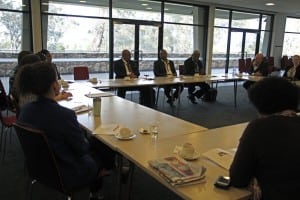
Kath Taplin
The Australian of the Year in 2015 is, of course, Rosie Batty. Rosie’s 11 year old son was killed by his father. She has said “… family violence happens to everybody. No matter how nice your house is, how intelligent you are. It can happen to anyone, and everyone.”
This violence is everyone’s problem to solve.
Parliaments in both Australia and Papua New Guinea are asking how to stop the violence that devastates families. Governments, companies and non-government organisations are asking this question.
There are solutions we can all share.
Femili PNG is a PNG NGO, supported by Papua New Guinea and Australian organisations working together in partnership. We know that none of us, alone, have all the solutions.
Femili PNG’s goal is “to improve access to, and effectiveness of, services for family and sexual violence survivors”.
We do this by providing case management services to survivors of family and sexual violence; working with and supporting other providers of services to survivors; and researching what does and does not work. We will use the evidence to advocate for change.
Femili PNG opened its doors to clients in Lae in July 2014. Because of our brilliant and dedicated PNG team in Lae, we are “wise beyond our year”.
Our case workers support the adult or child survivor through the system, advocating for them with the aim of achieving for her or him a life free from violence. The survivor, most often a woman and often with dependent children, is traumatised and needs access to assistance. She may need to engage with the police or to prepare statements for legal proceedings. She may need safe shelter, secure transport, and basics, like food. Her children may need medical care. Our case workers help her access what she needs, prioritising her safety at all times.
Case workers organise case conferences with the others responsible for providing services to the survivor. Representatives of the police, court, Department for Community Development, safe houses and others attend the case conferences to ensure everyone works in a coordinated and effective manner.
Femili PNG’s case workers provide tailored, professional assistance to each survivor for as long as she or he needs it. The survivor’s wishes and plans are central, guiding the assistance provided. Sometimes the safest option is relocation to another location in PNG. This kind of work is harder than it sounds–there is much more required than booking a ticket. Femili PNG assists with family tracing, working to make connections with extended family, village leaders, government officials and others in the survivor’s planned destination to make the relocation work for the woman and her dependents. Femili PNG works with partner organisations, like Oxfam, to provide them with some set-up support – including, for example, business start-up kits. Moving to a new location, and new life, where a survivor will genuinely be safer, is a detailed process.
The 2015 PNG Gender Based Violence Mapping Report from UNDP describes the importance of case management work very well.
“Case management serves the client best, monitoring and tracking and making sure the client does not drop out of the safety net created… case management keeps all the service providers on their toes, to demonstrate that they are delivering in the manner expected, needed and complementary to other services provided along the pathway and in the safety net….”
Without case management, the client may be lost among uncoordinated and unaccountable services, isolated and without real assistance. Our case managers work hard to prevent this for our 400+ (and growing) number of clients. It is very intensive work, as support is provided on an ongoing basis, for as long as the client needs. If the survivor’s matter is complex, and before a court, assistance may need to be provided for a lengthy period.
Importantly, Femili PNG could not work without its partners in the system. No service provider is an island—that would leave the survivor stranded.
Now in our second year, we have started forming partnerships beyond Lae. Recently I had the privilege of travelling to Lae and Kavieng with Femili PNG’s highly esteemed Vice Chair, Ms Ume Wainetti, who is also the National Coordinator of PNG’s National Family and Sexual Violence Action Committee (NFSVAC).
Ume was one of the people who originally saw the need for the Femili PNG case management centre. In 2013, she said:
“It’s a big need we have. … without case management, many cases referred for further assistance fell through, never went to the courts, and police never assisted them.”
Since making this statement, Ume has witnessed and assisted Femili PNG to develop the case management services she envisaged. Now she sees the importance of Femili PNG sharing what it is doing, with organisations and service providers elsewhere in PNG.
If Femili PNG can not only continue to provide case management that helps survivors achieve lives away from violence, but also share its experiences to assist the development of effective service provision elsewhere in PNG, then we will surely be making a difference.
Kath Taplin is Senior Development Manager for Femili PNG. This is an edited extract from a speech she delivered to a breakfast during the ANZ PNG Gender Parity Symposium in Canberra, October 2015.


